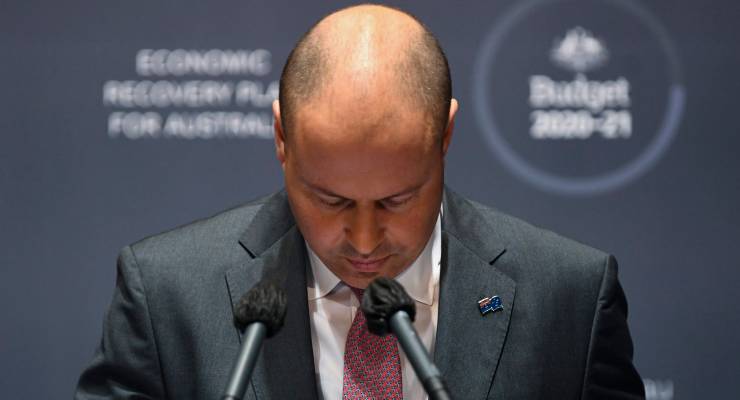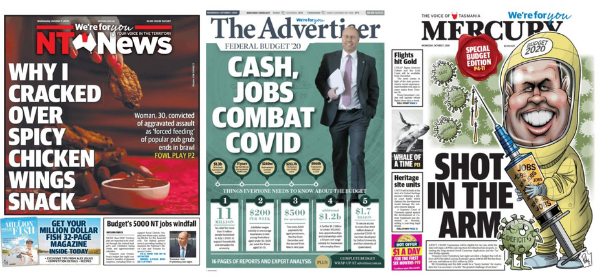
STRAP IN: A LOOK AT WHAT’S IN BUDGET 2020
Roughly seven months after COVID-19 plunged the world into a pandemic and eventual recession, Josh Frydenberg has unveiled a budget that pushes Australia’s debt ceiling to $1.1 trillion, forecasts debt peaking at $213.7 billion (11.0% of GDP) this financial year, and pledges billions for tax cuts, infrastructure, manufacturing, wage subsidies, and other stimulus elements.
Below are just some highlights, and links to government explainers where relevant, but make sure to check out Crikey’s Budget 2020 coverage for more:
- Accelerated tax cuts: Stage two of the already-legislated Personal Income Tax Plan will be brought forward to July 1, 2020, along with a one-off additional benefit from the low- and middle-income tax offset.
- Careful with attempts to spin this as boost for middle Australia: while the latter means lower- and middle-income earners will get a one-off payment of up to $2745 payment for singles or $5490 for dual income families, the former creates a permanent tax cut for the richest Australians.
- A “JobMaker” package that includes billions in previously-flagged infrastructure, manufacturing, apprenticeship and changes to university funding, which, now that Centre Alliance is on board, will more than double the cost of humanities degrees from next year.
- Immediate JobMaker hiring credits will be payable for 12 months to employers who hire people aged between 16 and 35 who have been on JobSeeker, Youth Allowance or the Parenting Payment for at least one of the past three months. Big banks will not be eligible for the credit, employees must be employed for a minimum of 20 hours a week, and the credit will be paid at the rate of $200 per week for those aged under 30, and $100 per week for those aged between 30 and 35.
- “Your Future, Your Super“‘ reforms that are designed to save $17.9 billion over 10 years by: no longer automatically creating new super accounts every time someone changes jobs; creating new reporting obligations for poor performing funds; and creating a new tracking app “YourSuper”.
- Consumer credit reforms will reduce the time and cost of credit assessments for consumers and businesses, while reducing the obligation on lenders to validate information provided by borrowers — a regulatory shift you might remember as the cause of the last global financial crisis.
FORECAST CORNER: Not helping the economic outlook is the fact net overseas migration is forecast to drop from around 154,000 in 2019-20 to negative 72,000 by the end of 2020-21 — a rate that is expected to jump back to around 201,000 in 2023-24 — or that fertility is set to drop from 1.69 in 2019-20 to 1.61 in 2020-21 and a low of 1.58 in 2021-22.
Also, note that the budget relies on an at best optimistic assumption that there will be a population-wide Australian COVID-19 vaccination in place by late 2021, and that border restrictions and social distancing measures will be progressively lifted.
…AND WHAT’S NOT IN BUDGET 2020?
Following the release of the budget, Labor leader Anthony Albanese has hit out at the plan to keep JobSeeker at about $40 a day, as well as the government’s lack of action on social housing, clean energy, childcare and aged care.
While The Guardian reports that Labor will back the stage two tax cuts, Greens leader Adam Bandt — who otherwise echoed Albanese’s complaints — has pledged to fight “tax handouts to the super-wealthy”.
As Crikey covered last night, the budget has some obvious winners — notably farmers, the Family Court system, gas, and mental health and domestic violence services — as well as significant losers:
- Older workers and public housing: The JobMaker hiring credit excludes anyone who lost their job throughout COVID-19 aged over 35, while there is zero new funding for public housing despite submissions throughout the year from groups including The Community Housing Industry Association, National Shelter, and Homelessness Australia as well as researchers citing long-term declines in social housing.
- Unemployed Australians and temporary visa holders: The budget includes no increase to Newstart — which has remained at the same real-term rate for more than 25 years — and no extension to the coronavirus supplement after it expires at the end of December. Similarly, there is nothing in there for non-residents left out of the JobKeeper/JobSeeker welfare support payments.
- Public broadcasters: Seven years on from Tony Abbott’s pledge of “no cuts to the ABC”, the budget has again cut ABC’s general operational activities, this time from $939 million in 2019-20 to $898 million in 2020-21. No matter what Communications Minister Paul Fletcher might try to tell you, spending on public broadcasting is set to fall 0.7% from 2019-20 to 2020-21, and by 3.7% between now and 2023-24.
- The Auditor-General: Despite calls from the Centre for Public Integrity to reinstate recent cuts to the Australian National Audit Office, the budget actually slashes funding from the auditor — a persistent headache for the Morrison government — from $112 million in 2019-20 to $98 million for 2020-21; the government has, however, found more than $3 million to boost the Governor-General’s budget from $24.9 million to $28.9 million.
- Aged care: Most residential aged funding — from an extra $1.6 billion across four years for 23,000 extra home care packages to abolishing tax on granny flats provided they are occupied by someone with a disability or an older Australian with a formal written agreement — relates to pandemic responses instead systemic changes such as staffing ratios.
- Renewables and electric vehicles: Finally, RenewEconomy reports, the package includes an unspecified amount of funding for the Vales Point coal fired generator — which is co-owned by Liberal Party donor Trevor St Baker — apparently for upgraded turbines and high pressure heaters. But while the budget includes $52 million for new gas fields and infrastructure, a $1.9 billion new technology package focuses on technologies other than solar and wind (i.e. carbon capture, hydrogen, agriculture etc) while electric vehicles apparently get just $5 million over four years, specifically for a new assembly plant and vehicle-to-grid trial.
PS: For a depressing reminder of just what Australia missed out on by rejecting a clean energy recovery, check out South Korea’s $135 billion “K-New Deal” for solar, wind, smart grids, microgrids and electric vehicles.
There’s also the EU’s plan to spend more than 500 billion euros on renewables, EVs and agriculture; Nigeria’s “solar power strategy” to bring 5 million solar home systems and mini-grids to 25 million individual residents not currently connected to the national grid; and even Boris Johnson’s plan announced yesterday to power every home in the UK with offshore wind farms by 2030.
MOMENT OF TRUTH: TRUMP RETURNS TO WHITE HOUSE
While we should all settle in for at least another 24 hours of non-stop budget takes, just two updates on the US election: Donald Trump has returned to the White House, where, still infected with COVID-19, he took his mask off to talk to reporters (The Intercept); and the president has apparently overruled FDA guidelines in attempting to rush through approvals for a vaccine in time for next month’s election (NYMag).
[free_worm]
THEY REALLY SAID THAT?
I will be forever grateful to Flinders University for my arts degree. It took me 10 years to complete while working and raising three children. I would not have had my career or the privilege of sitting in the House of Representatives without it.
Rebekha Sharkie
The Centre Alliance MP extols the virtues of an arts degree roughly four months before committing to vote to double its cost.
CRIKEY RECAP
Spend, spend, spend — Frydenberg’s road to recovery relies on the Great Australian Binge
“Between the stage two tax cuts, brought forward to this financial year, and a 100% investment write-off for all but the very largest businesses, taxpayers will fork out nearly $45 billion over four years in the two biggest ticket items in a budget filled with unprecedented numbers.
“But low-income earners and the unemployed receive little: low-income earners will get only half the tax cut that middle- and high-income earners receive, while the unemployed still face a New Year nightmare as JobSeeker payments revert to their below-poverty pre-COVID level at the end of the year.”
Solid effort followed by disappointment as government squibs reform
“In terms of plugging the economic hole brought about by the pandemic, the government has done the right thing, if perhaps not quite enough of the right thing.
“The $101 billion to date spent on JobKeeper to support 3.5 million jobs, a massively expanded JobSeeker unemployment benefits program, and boosts to other income support measures are all very important and wise things to have done.”
Crazy ants, dried fruit and weather boffins’ safety: strange spending measures
“Dried fruit, nuts and prawns: A recession ultimately leads to fewer fancy cocktail parties, and prawn farmers have said they’re struggling. In response, there will be no white spot disease repayment levy and export charge component on farmed prawns for the next year. Macadamias will get a little cheaper next year too, with the $0.02 per kilogram levy and export charge cut.”
READ ALL ABOUT IT
Victoria enters uncharted waters, urged to trace contacts of contacts
James Packer tells Crown inquiry threats he made in 2015 were ‘shameful’
COVID-19 vaccine may be ready by the end of the year, WHO says
Ardern v Collins: New Zealand party leaders clash in lively but muddled debate
Chemical weapons body confirms nerve agent Novichok in Navalny’s blood
“Tasteless:” Matt Canavan slammed over use of “Black Coal Matters” slogan
Department, minister dodge questions on Leppington Triangle airport investigation
Three scientists share Nobel prize in physics for work on black holes
China’s global reputation plunges in the wake of coronavirus pandemic
THE COMMENTARIAT
Budget 2020: A lot must go right, we assume ($) — Dennis Shanahan (The Australian): “The early release of a viable COVID-19 vaccine next year and the relaxation of Australia’s domestic and international borders could give the economy a $34b boost to June 2022 and push GDP 1.5 percentage points above the budget forecast of 4.25%. But the absence of a vaccine, continued coronavirus outbreaks in Australian states and globally, and lockdown restrictions would cut $55b from the economy and reduce growth in both 2020-21 and 2021-22 by a full percentage point.”
Tax cuts more about popularity than digging economy out of recession‘ — Ross Gittins (The Sydney Morning Herald): “If you remember, when stage one of these tax cuts allowed people getting the new ‘low and middle income tax offset’ to receive a flat $1080 refund in July and August last year, Mr Frydenberg confidently predicted it would give a fillip to retail sales. Didn’t happen. Summarising, the new tax cut will be worth the equivalent of almost $21 a week to those earning between $50,000 and $90,000 a year, but about $49 a week to those earning more than $120,000 a year.”
The unprecedented and illegal campaign to eliminate Julian Assange — Charles Glass (The Intercept): “Over the 17 days of Julian Assange’s extradition hearing in London, prosecutors succeeded in proving both crimes and conspiracy. The culprit, however, was not Assange. Instead, the lawbreakers and conspirators turned out to be the British and American governments. Witness after witness detailed illegal measures to violate Assange’s right to a fair trial, destroy his health, assassinate his character, and imprison him in solitary confinement for the rest of his life. Courtroom evidence exposed illegality on an unprecedented scale by America’s and Britain’s intelligence, military, police, and judicial agencies to eliminate Assange. The governments had the edge, like the white man of whom Malcolm X wrote, He’s a professional gambler; he has all the cards and the odds stacked on his side, and he has always dealt to our people from the bottom of the deck.’”
HOLD THE FRONT PAGE

WHAT’S ON TODAY
Canberra
-
Josh Frydenberg will deliver a post-budget address at the National Press Club.
Australia
-
Crikey’s editor-in-chief Peter Fray, political editor Bernard Keane, political contributor Janine Perrett and economics correspondent Jason Murphy will discuss “Budget 2020 — Where to now?” in a Crikey Talks event at 12.30pm AEDT. This event is for our Inside Access members — you can upgrade here or become a member here.
-
The Australia Institute will host webinar event “Federal Budget Unpacked” at 11am AEST, with deputy director Ebony Bennett, chief economist Richard Denniss and senior economist Matt Grudnoff.











Crikey is committed to hosting lively discussions. Help us keep the conversation useful, interesting and welcoming. We aim to publish comments quickly in the interest of promoting robust conversation, but we’re a small team and we deploy filters to protect against legal risk. Occasionally your comment may be held up while we review, but we’re working as fast as we can to keep the conversation rolling.
The Crikey comment section is members-only content. Please subscribe to leave a comment.
The Crikey comment section is members-only content. Please login to leave a comment.